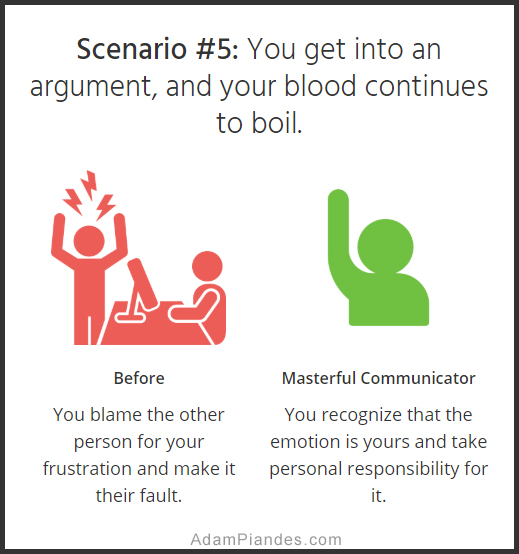For a few months, I will provide a series of 12 scenarios that I hope you’ll find thought-provoking.
The intention behind this is to create simple, relevant experiences that are relatable and may “show up” in your day-to-day activities.
Each scenario will display a “before” and “after” comparison, encouraging you to think about how the particular scenario may play a role in your life.
Along with this, I’ll provide some additional thoughts/questions that will support you in your journey towards becoming a masterful communicator.
In all of the examples, the “after” is replaced with “Masterful Communicator”...
Here ya go…
Blaming someone for your emotional upset is an easy thing to do, especially when your blood starts to boil amidst an argument.
Pointing the finger, and having a “you did this to me” response to others is somewhat natural in this instance.
Perhaps you’ve heard of the fight-or-flight response, also known as the acute stress response?
It refers to the physiological reaction that occurs in the presence of something that is terrifying, either mentally or physically…..
…..in this case, the “terrifying event” is an argument.
Here’s what happens… hormones get released in your body and trigger a response…Either:
1) Fight – stay and deal with a threat, or
2) Flight – run away to safety.
In this scenario, I’m focusing on #1: the “fight” response; staying and dealing with a threat.
Today’s scenario: ”You get into an argument, and your blood continues to boil.” The operative word in this scenario is “continues”….
Meaning…after the argument, you continue to hold onto your resentment, and in this case, blame the other person for your frustration and make it their fault.
Have you ever done this?..hmmmm.
I most certainly have!
When you consider how often our society encourages you to blame other people, as a way of dealing with your problems, it’s no wonder you have a propensity to do this.
Everywhere you look, especially in the media, someone is pointing the finger at someone else, claiming that “they’re wrong”, or “they shouldn’t have done that.”, etc.
It’s easy to blame others, and not take responsibility.
However, this is the type of behavior that keeps you in the victim seat.
The victim points the finger at other people and claims, “look what the world is doing to me”.
On the other hand, the empowered one claims, “look how I’m choosing to relate to the world”.
The empowered one understands that the emotions that come to the surface during an argument are emotions that are already stored from within.
These emotions are triggered by the other person, not the fault of the other person, and this is a HUGE distinction.
Taking it a step further, it can actually be beneficial to thank the other person for “helping” you to bring your emotions to the surface.
Why?
Because the more willing you are to take responsibility for your emotions, and better understand the root cause, the better you position yourself to respond from a place of balance and stability in the future.
Now, you may be saying, “whatever, dude, in the middle of an argument, shit’s gonna happen. I’m gonna get upset.”
I couldn’t agree more. You’re human. You’re going to have emotional responses, and outbursts. It’s a natural part of being alive and in relationship to others.
HOWEVER, the question then becomes, what do you do AFTER the argument?
Do you harbor resentment?
Do you continue to point your finger and blame the other person?
Do you continue to ruminate over your rightness and their wrongness?
If you said, yes to any of these things, there may be an opportunity for you to stop, take a deep breath, and ask yourself, “what is the root cause of my frustration/anger/resentment?”
If you’re willing to do this, you’ll soon realize that your emotional instability has nothing to do with the person on the other end of the argument, and has everything to do with you.
This sort of behavior isn’t always obvious, so it becomes important to stay aware of the negative stories, thoughts, patterns, etc that show up in your day to day, and amidst your interactions with others.
How does this show up at work?
How does this show up in your personal life?
A few questions for you to ponder over the course of your week.
Cheers,
ap



